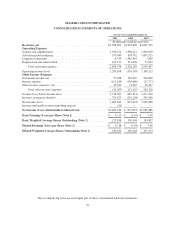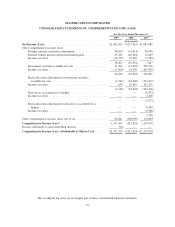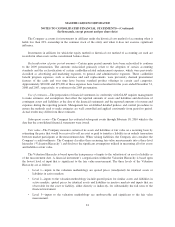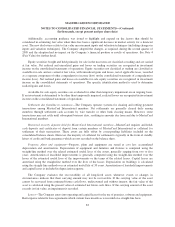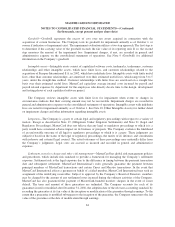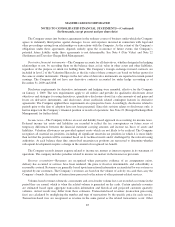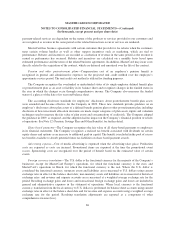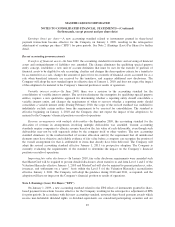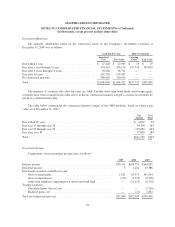MasterCard 2009 Annual Report Download - page 94
Download and view the complete annual report
Please find page 94 of the 2009 MasterCard annual report below. You can navigate through the pages in the report by either clicking on the pages listed below, or by using the keyword search tool below to find specific information within the annual report.MASTERCARD INCORPORATED
NOTES TO CONSOLIDATED FINANCIAL STATEMENTS—(Continued)
(In thousands, except percent and per share data)
Goodwill—Goodwill represents the excess of cost over net assets acquired in connection with the
acquisition of certain businesses. The Company tests its goodwill for impairment annually as of October 1, or
sooner if indicators of impairment exist. The impairment evaluation utilizes a two step approach. The first step is
to determine if the carrying value of the goodwill exceeds the fair value of its reporting unit. If so, the second
step measures the amount of the impairment loss. Impairment charges, if any, are recorded in general and
administrative expense on the consolidated statements of operations. See Note 9 (Goodwill) for additional
information on the Company’s goodwill.
Intangible assets—Intangible assets consist of capitalized software costs, trademarks, tradenames, customer
relationships and other intangible assets, which have finite lives, and customer relationships related to the
acquisition of Europay International S.A. in 2002, which have indefinite lives. Intangible assets with finite useful
lives, other than customer relationships, are amortized over their estimated useful lives, which range from 3 to 5
years, under the straight-line method. Customer relationships with finite lives are amortized on a straight line
basis over their estimated useful lives. MasterCard capitalizes average internal costs incurred for payroll and
payroll related expenses by department for the employees who directly devote time to the design, development
and testing phases of each capitalized software project.
The Company reviews intangible assets with finite lives for impairment when events or changes in
circumstances indicate that their carrying amount may not be recoverable. Impairment charges are recorded in
general and administrative expense on the consolidated statements of operations. Intangible assets with indefinite
lives are tested for impairment annually as of October 1. See Note 10 (Other Intangible Assets) for further detail
on impairment charges and other information regarding intangible assets.
Litigation—The Company is a party to certain legal and regulatory proceedings with respect to a variety of
matters. Except as described in Note 19 (Obligations Under Litigation Settlements) and Note 21 (Legal and
Regulatory Proceedings), MasterCard does not believe that any legal or regulatory proceedings to which it is a
party would have a material adverse impact on its business or prospects. The Company evaluates the likelihood
of an unfavorable outcome of all legal or regulatory proceedings to which it is a party. These judgments are
subjective based on the status of the legal or regulatory proceedings, the merits of its defenses and consultation
with in-house and external legal counsel. The actual outcomes of these proceedings may materially differ from
the Company’s judgments. Legal costs are accrued as incurred and recorded in general and administrative
expenses.
Settlement, travelers cheque and other risk management—MasterCard has global risk management policies
and procedures, which include risk standards to provide a framework for managing the Company’s settlement
exposure. Settlement risk is the legal exposure due to the difference in timing between the payment transaction
date and subsequent settlement. MasterCard International’s rules generally guarantee the payment between
principal members of MasterCard transactions and certain Cirrus and Maestro transactions. In the event that
MasterCard International effects a payment on behalf of a failed member, MasterCard International may seek an
assignment of the underlying receivables. Subject to approval by the Company’s Board of Directors, members
may be charged for the amount of any settlement losses incurred during the ordinary activities of the Company.
MasterCard has also guaranteed the payment of MasterCard-branded travelers cheques in the event of issuer
default. The term and amount of these guarantees are unlimited. The Company accounts for each of its
guarantees issued or modified after December 31, 2002, the adoption date of the relevant accounting standard, by
recording the guarantee at its fair value at the inception or modification of the guarantee through earnings. To the
extent that a guarantee is modified subsequent to the inception of the guarantee, the Company remeasures the fair
value of the guarantee at the date of modification through earnings.
84




